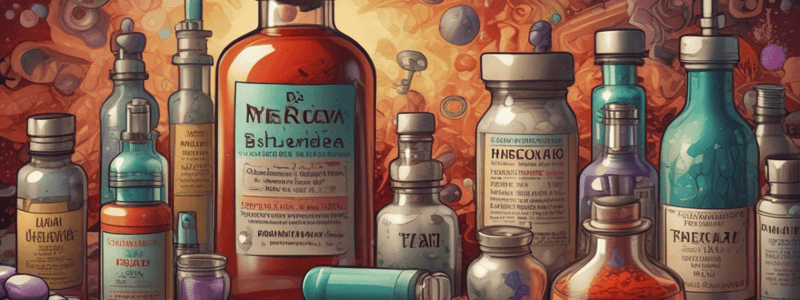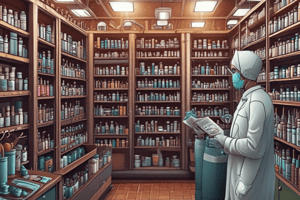Podcast
Questions and Answers
What type of reaction is mediated by IgG and involves tissue deposition of drug-antibody complexes with complement activation and inflammation?
What type of reaction is mediated by IgG and involves tissue deposition of drug-antibody complexes with complement activation and inflammation?
- Type IV: Delayed Hypersensitivity Reactions
- Idiosyncratic Reactions
- Type I: Anaphylaxis
- Type III: Arthus Reactions (correct)
What is the result of the combination of a hapten with a larger carrier such as a protein?
What is the result of the combination of a hapten with a larger carrier such as a protein?
- Activation of complement and lysis of cells
- Production of antibodies that bind specifically to the carrier
- Phagocytosis by natural killer cells and macrophages
- Production of antibodies that bind specifically to the hapten (correct)
What is the timing of a Type III reaction?
What is the timing of a Type III reaction?
- 2 to 7 days after cutaneous drug exposure
- Variable, may take hours to a day
- Immediate, occurring within minutes
- 1 to 3 weeks after drug exposure (correct)
What is the main mechanism of Type IV reactions?
What is the main mechanism of Type IV reactions?
What is an idiosyncratic reaction?
What is an idiosyncratic reaction?
What is the result of the tagging of cells in a hypersensitivity reaction?
What is the result of the tagging of cells in a hypersensitivity reaction?
What is a clinical manifestation of serum sickness?
What is a clinical manifestation of serum sickness?
What type of reaction involves the destruction of RBCs, WBCs, and platelets?
What type of reaction involves the destruction of RBCs, WBCs, and platelets?
What is the mechanism of idiosyncratic reactions?
What is the mechanism of idiosyncratic reactions?
What is the clinical diagnosis for patients with adverse reactions to two or more structurally unrelated drugs with an underlying immune-mediated mechanism causing the reaction?
What is the clinical diagnosis for patients with adverse reactions to two or more structurally unrelated drugs with an underlying immune-mediated mechanism causing the reaction?
Which type of drug allergy is mediated by IgE antibodies?
Which type of drug allergy is mediated by IgE antibodies?
Which of the following are considered main targets of Type 1 anaphylactic reactions?
Which of the following are considered main targets of Type 1 anaphylactic reactions?
Which of the following statements about the fragment constant (Fc) portion of IgE is true?
Which of the following statements about the fragment constant (Fc) portion of IgE is true?
What is the main mechanism by which anaphylactic reactions cause vasodilation and inflammation?
What is the main mechanism by which anaphylactic reactions cause vasodilation and inflammation?
What type of drug allergy is characterized by IgG or IgM antibodies directed at drug-hapten coated cells?
What type of drug allergy is characterized by IgG or IgM antibodies directed at drug-hapten coated cells?
What type of reaction is termed "immediate hypersensitivity reaction"?
What type of reaction is termed "immediate hypersensitivity reaction"?
What is the typical timing of anaphylactic reactions after drug exposure?
What is the typical timing of anaphylactic reactions after drug exposure?
What is the primary concern for patients with a history of multiple drug allergies?
What is the primary concern for patients with a history of multiple drug allergies?
What does the therapeutic index indicate about a drug?
What does the therapeutic index indicate about a drug?
Which type of adverse drug reactions (ADRs) are predictable and related to pharmacologic actions?
Which type of adverse drug reactions (ADRs) are predictable and related to pharmacologic actions?
What accounts for less than 10% of all adverse drug reactions?
What accounts for less than 10% of all adverse drug reactions?
Which factor is NOT a risk factor for drug allergy?
Which factor is NOT a risk factor for drug allergy?
What can lead to genotoxic reactions from drugs?
What can lead to genotoxic reactions from drugs?
Which statement about clinical sensitization is true?
Which statement about clinical sensitization is true?
What is one way in which a drug can cause allergic reactions?
What is one way in which a drug can cause allergic reactions?
Which route of administration has been associated with severe allergic reactions?
Which route of administration has been associated with severe allergic reactions?
Which of the following is a characteristic of idiosyncratic reactions?
Which of the following is a characteristic of idiosyncratic reactions?
What is a potential outcome of drug interactions?
What is a potential outcome of drug interactions?
Which term describes the scenario where two drugs produce an effect that is less than the sum of their individual effects?
Which term describes the scenario where two drugs produce an effect that is less than the sum of their individual effects?
What is the primary goal when treating poisoning?
What is the primary goal when treating poisoning?
What is the initial step in decontamination after poisoning?
What is the initial step in decontamination after poisoning?
What technique involves the removal of drugs from the body by filtering the blood extracorporeally?
What technique involves the removal of drugs from the body by filtering the blood extracorporeally?
Which method of gastric emptying can be used in children and adults following poisoning?
Which method of gastric emptying can be used in children and adults following poisoning?
What is a contraindication for the use of syrup of Ipecac?
What is a contraindication for the use of syrup of Ipecac?
What type of antidote functions by forming an inert complex with a poison?
What type of antidote functions by forming an inert complex with a poison?
Which antidote acts as a glutathione substitute to detoxify hepatotoxic paracetamol metabolites?
Which antidote acts as a glutathione substitute to detoxify hepatotoxic paracetamol metabolites?
How is gastric lavage usually performed in adults?
How is gastric lavage usually performed in adults?
Which strategy is NOT a primary approach for gastrointestinal decontamination?
Which strategy is NOT a primary approach for gastrointestinal decontamination?
Which substance inhibits the metabolism of methanol to its toxic metabolites?
Which substance inhibits the metabolism of methanol to its toxic metabolites?
What are toxidromes?
What are toxidromes?
What method uses oxygen to bypass toxic effects in cyanide poisoning?
What method uses oxygen to bypass toxic effects in cyanide poisoning?
Which antidote is known for competitively displacing poisons from receptor sites?
Which antidote is known for competitively displacing poisons from receptor sites?
Which antidote blocks the effects of anti-ChE agents such as organophosphate compounds?
Which antidote blocks the effects of anti-ChE agents such as organophosphate compounds?
What is the action of thiosulphate in relation to cyanide?
What is the action of thiosulphate in relation to cyanide?
Which type of antidote utilizes a different cellular mechanism to counteract a poison?
Which type of antidote utilizes a different cellular mechanism to counteract a poison?
Flashcards are hidden until you start studying
Study Notes
Toxicology Overview
- Toxicology studies adverse effects of chemicals on living organisms.
- Higher therapeutic index indicates a safer drug.
Adverse Drug Reactions (ADRs)
- Broadly classified into predictable and unpredictable reactions.
- Predictable ADRs include dose-dependent reactions and drug interactions.
- Unpredictable ADRs arise from immunological responses and genetic differences.
- ADRs contribute to 3% to 6% of hospital admissions and affect 10% to 15% of hospitalized patients.
Types of Therapeutic Drug Toxicity
- Dose-dependent reactions: Severity linked to drug concentration and exposure duration.
- Allergic reactions: Mediated by the immune system, causing less than 10% of ADRs.
- Idiosyncratic reactions: Unique adverse effects not explained by drug mechanisms.
- Drug-drug interactions: Altered absorption, binding, biotransformation, or excretion rates.
Dose Dependent Reactions
- Include pharmacological (dose-related), pathological (overdose findings), and genotoxic (DNA injury).
Allergic Reactions
- Caused by previous sensitization; most reactions occur 1-2 weeks post-exposure.
- Drug allergy prevalence is low, but misdiagnoses in children are common.
Risk Factors for Drug Allergy
- Drug factors: Chemical nature and changes in exposure levels can influence allergy risk.
- Host factors: Age, underlying health conditions, and previous drug reactions can predispose individuals to allergies.
Drug Allergy Mechanisms
- Four categories based on immunological involvement:
- Type 1: Anaphylactic reactions mediated by IgE, resulting in rapid symptoms.
- Type II: Cytolytic reactions involving IgG or IgM targeting drug-coated cells.
- Type III: Arthus reactions characterized by immune complex deposition and delayed symptoms.
- Type IV: Delayed hypersensitivity reactions mediated by T-lymphocytes.
Idiosyncratic Reactions
- Result from abnormal individual reactivity due to genetic factors or enzyme variability.
- Do not follow typical drug therapy patterns.
Drug-Drug Interactions
- Can lead to additive, synergistic, potentiated, or antagonistic effects on pharmacodynamics.
Prevention of Poisoning
- Adhere to the “5 Rights” for safe medication administration (right drug, patient, dose, route, and time).
Principles of Treatment of Poisoning
- Maintain vital functions while reducing poison concentrations in tissues.
- Identification of clinical patterns known as toxidromes aids in diagnosis.
Decontamination Strategies
- Involves stopping further exposure and employing gastrointestinal decontamination methods (gastric emptying, adsorption, irrigation, catharsis).
Gastric Emptying Techniques
- Induced vomiting with syrup of ipecac can generally produce quick emesis, but has contraindications.
- Gastric lavage involves the insertion of an orogastric tube for stomach content removal.
Extracorporeal Techniques
- Techniques include peritoneal dialysis, hemodialysis, or hemoperfusion for certain drug elimination.
Antidotal Therapies
- Chemical antidotes neutralize toxins; pharmacologic antidotes compete with poison at receptor sites; physiological antidotes work via different cellular mechanisms.
Mechanisms of Antidotal Action
- Inert complex formation, accelerated detoxification, reduced toxic conversion, receptor site competition, receptor site blockade, and toxic effect bypass (e.g., 100% oxygen for cyanide) are key antidotal mechanisms.
Studying That Suits You
Use AI to generate personalized quizzes and flashcards to suit your learning preferences.




